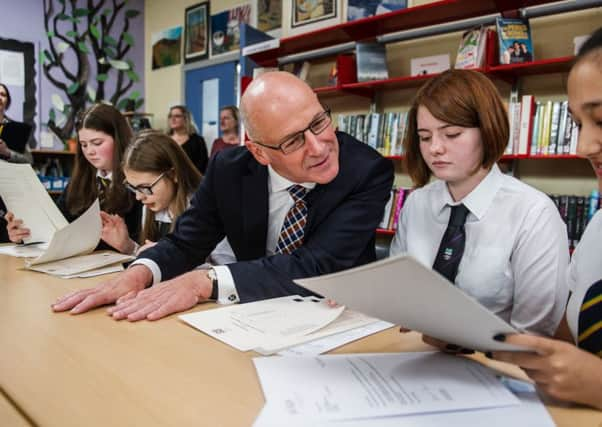Leaders: Sturgeon must work harder to get pass marks on education


After all the hard work, it’s the day when the effort has either been worth it – or not enough. And as pupils and students in Scotland received their exam results yesterday, perhaps the biggest sigh of relief came from the examiners, who last year had to cut the “pass” mark in Higher maths to just 34 per cent after the exam was found to be too difficult.
This year’s results were largely a success story, with one of the stand-out statistics showing that more pupils from Scotland got a university place on results day than in any previous year. In addition, the 152,701 Higher passes represent the second highest number on record, although the pass rate fell by two per cent. Congratulations go to those who achieved their goal, and commiserations to those who fell short on this occasion.
Advertisement
Hide AdAdvertisement
Hide AdAfter last year’s fallout over Higher maths, and with fears over a problem with Higher English this year proving unfounded, the big picture is one of a successful year.
But it would be a mistake to interpret the results as a sign of improving standards, because since the First Minister’s pledge to close the attainment gap in education, a strategy has yet to be implemented. Opposition parties were quick to highlight the attainment gap yesterday, with pupils from the most prosperous backgrounds still four times more likely to gain university entrance than those from the poorest areas.
It would also be an error to take the results alone as evidence of a more educated population beginning to emerge. Those who have attained grades which gain them places in further education have a long way to go before their contribution to society can be considered any more significant than that of previous generations.
Choosing an appropriate university course, completing it successfully, and finding a relevant career have yet to be negotiated, and there will be many pitfalls along the way.
It would also be premature to conclude that a 19 per cent increase in the number of students from EU countries being accepted to Scottish universities means there is no evidence of EU students being put off by the Brexit vote, as was claimed yesterday.
Applications for places were made long before the UK voted to leave the European Union, and the withdrawal’s effect will not become clear until next year at the earliest. A lack of clarity over the future status of EU applicants could have a negative effect on applications, and any sense that Brexit could impact on EU resources available to universities for research could also have a negative effect on the lucrative market of non-EU students, who pay hefty fees.
Clarity is also required for the domestic intake. If an increasing number are reaching university each year, progress would be undermined if the universities hit funding difficulties. Their business models are built on attracting fee-paying overseas students.
If that is to change post-Brexit, it will have serious consequences for higher education in Scotland – and for those whose hopes and dreams are built on yesterday’s results.
Aid for Aleppo must be priority
Advertisement
Hide AdAdvertisement
Hide AdWithout the dramatic images of immigrants arriving in Europe, seeing the sad reality of the Syrian refugee crisis, it is easy to forget about the cause of that crisis, the war tearing Syria apart.
But we should not, because human tragedy is still unfolding. Any hope of the partial truce brokered by the US and Russia bringing significant relief to the suffering has been dashed. Now the United Nations is warning that children in Aleppo, Syria’s second city, are at “grave risk” of disease unless water supplies are immediately repaired.
The fighting around Aleppo has been fierce in recent weeks, the forces of Syrian President Bashar al-Assad advancing on rebels with the help of Russian air strikes. It has resulted in the water supplies being cut off while the city also struggles with a heat wave.
In the meantime the Syrian government is dallying on its way to the latests round of peace talks in Geneva, it has already said its negotiating team will arrive late, and the clear implication is that the war is currenltly going well for them so the longer they delay the closer they get to victory.
But that delay also means that thousands of more lives may be lost and some of those might be children of Aleppo. There is no time for the peacetalks to start before aany action is taken. The fighting around Aleppo should be suspended immediately to allow a humanitarian relief effort to restore water supplies and vital medical aid to the civilians trapped there. Assad has only got the upper hand through the Russian support he receives. Russia must surely bring pressure to bear to declare a ceasefire around Aleppo. Putin knows that Assad will listen to him.